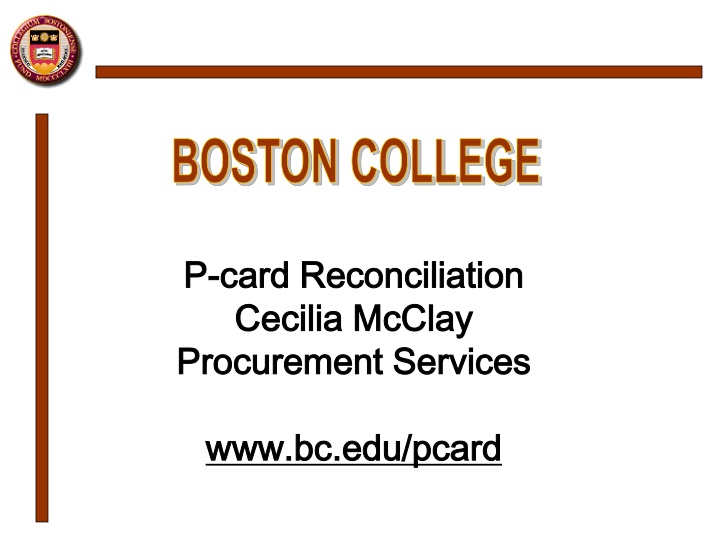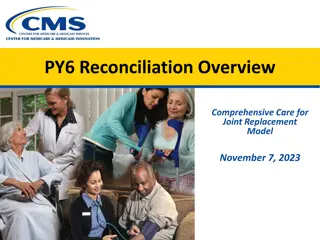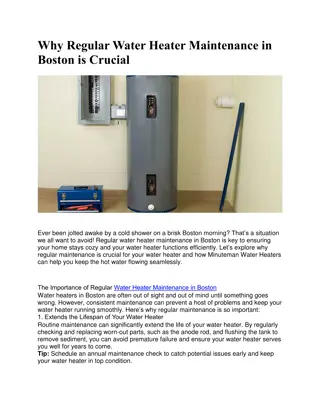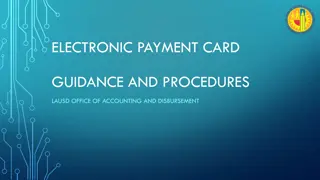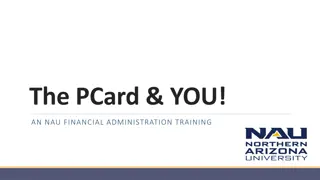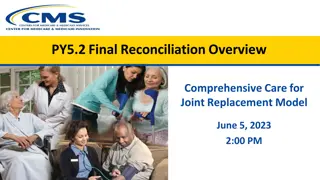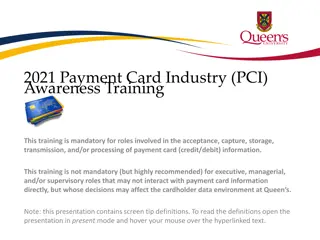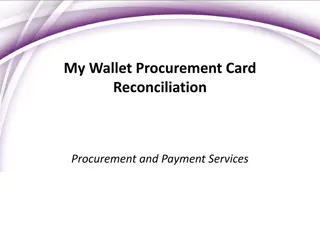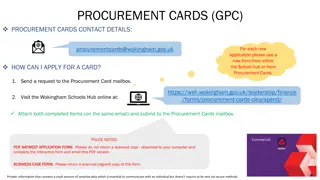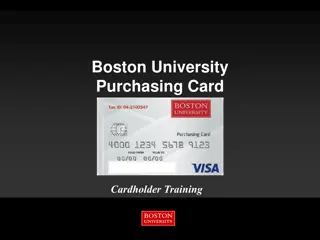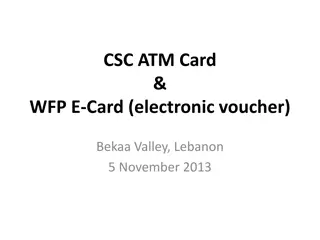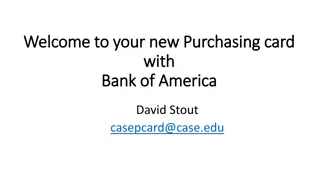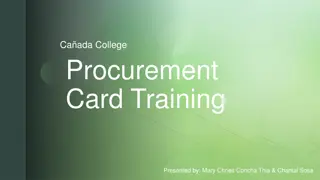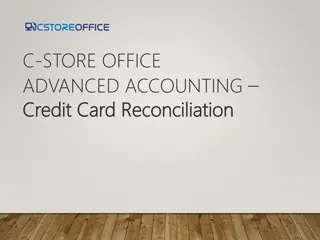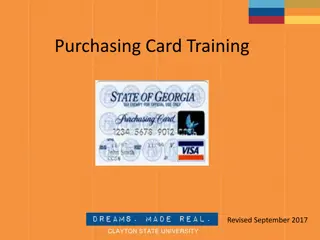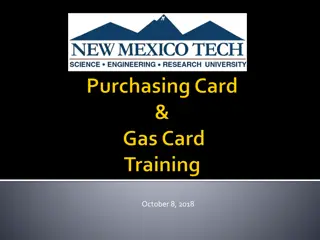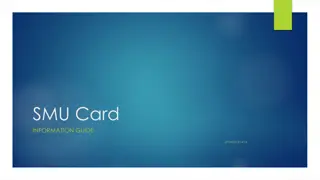Boston College P-Card Reconciliation and Responsibilities Guide
This guide outlines the procedures and responsibilities related to P-Card reconciliation at Boston College. It covers the roles of cardholders, departmental P-Card administrators, service centers, and the P-1 individual. Responsibilities include assigning administrators, monitoring cardholders, purchasing goods, reviewing policies, setting limits, and maintaining budgets. Adherence to these guidelines ensures proper utilization of P-Cards and compliance with university policies.
Download Presentation

Please find below an Image/Link to download the presentation.
The content on the website is provided AS IS for your information and personal use only. It may not be sold, licensed, or shared on other websites without obtaining consent from the author.If you encounter any issues during the download, it is possible that the publisher has removed the file from their server.
You are allowed to download the files provided on this website for personal or commercial use, subject to the condition that they are used lawfully. All files are the property of their respective owners.
The content on the website is provided AS IS for your information and personal use only. It may not be sold, licensed, or shared on other websites without obtaining consent from the author.
E N D
Presentation Transcript
BOSTON COLLEGE P P- -card Reconciliation card Reconciliation Cecilia Cecilia McClay Procurement Services Procurement Services McClay www.bc.edu/pcard www.bc.edu/pcard
Class Purpose To explain the University requirements for p-card reconciliation and the different responsibilities of: 1) Cardholders 2) Departmental P-card Administrators (or P-2) 3) Service Centers 4) The P-1
Responsibilities P-1 Must assign the Departmental P-Card Administrator Is aware of all p-card holders in the department/s. Must run a report annually listing all current cardholders Must take responsibility of a card when an employee leaves or is on medical leave until it is deactivated on PeopleSoft Service Centers Take the role as Departmental P-Card Administrator for smaller departments or departments without administrators. Provide administrative support to departments by creating requisitions, p-card applications, p-card troubleshooting, budget transfers, etc
Responsibilities Cardholder Purchase goods for the department : must be familiar with what is allowed and what is not allowed on p-card as well as provide non- contracted suppliers with the tax exempt certificate. (available at: bc.edu/tax) Should be using BC s contracted suppliers whenever possible. Pull his/her statement on a monthly basis Match statements to receipts Maintain the documentation for Internal Audit. (best practice: scan receipts along with the statement and put into a secured server) Monitor his/her p-card activity on a regular basis. Inform the P-2 of any missing receipts and document it. Turn in his/her card on the last day of employment
Departmental P-Card Administrator Responsibilities Reviewing policies and fund requests with cardholder Ensuring that best practices are used whenever possible for small dollar invoices (under 5000.00), encouraging the use of p-card and its value to the University by saving on transactional costs, and limiting the amount of small dollar vouchers, purchase orders and reimbursements where allowable. Creating departmental accounts for p-card and cardholders using PeopleSoft P- card screens Determining and setting individual limits as determined by the department and University standards Maintaining and updating cardholder information Updating cardholders of any policy or other changes affecting p-card use. Troubleshooting issues within the department
Departmental P-Card Administrator Responsibilities Deactivating p-cards for employees who have left the University, have moved to another department, or should no longer have access to the applicable chart string. Maintaining adequate budgets in the p-card accounts, including monitoring P- cards for low budget. Making or requesting budget transfers. Reconciling of cardholder statements to PeopleSoft accounts. Reviewing transactions for compliance with University as well as restricted funds policies and procedures and ensuring cardholders are familiar with the restrictions Identifying possible fraud issues. Reviewing cardholders policies for receipt requirements designated by the University and the department. Reviewing and monitoring p-card needs for fiscal year end.
What receipts is the cardholder required to save? All receipts from non-contracted vendors no matter what the dollar amount *All receipts from contracted, level 3 suppliers over $1000.00 All receipts for meetings and meals, including any BC Dining facility, along with a list of attendees and business purpose. If there are more than 10 people, then a group may be listed. ie: snacks for new employee orientation, total attendees: 21
*Receipts for Level 3 Suppliers Receipts for purchases under $1000.00 do not need to be held for Contracted Level 3 Suppliers. Level 3 Suppliers provide line item data which can be viewed in PeopleSoft Financials. This rule does not apply to grants. (all receipts for grants must be saved.) AirGas/Linde Gas Allied Waste Anixter Science Cylinders Rubbish Removal Network Needs Macintosh Computers and Peripherals- NOT FROM ANY APPLE STORE Apple Computer (APL On-Line ONLY) Auto Zone Boston Bean CDW Dell Computer Federal Express Fisher Scientific Henry Schein Pitney Bowes VWR WB Mason Facilities Vehicle Needs Coffee and Tea Computer Peripherals Dell Computers Express Mail Provider Primary Lab Supply Provider Medical Supplies Postal Meter, Postage-On-Line Secondary Lab Supplies Office Supplies
How long are receipts held? University Sponsored, Fund Code 100, 920 (student agencies) 220 (gift accounts) and 820 (capital projects) 3 fiscal years Grants: Fund Code 500 and 120: life of the grant plus a minimum of three years after the submission of the final expenditure report for restricted, funding agencies, contract or grant funds ledger accounts
Reconciliation and Access-on-line Every cardholder and Administrator MUST have access to US Bank s Access-on-line. https://access.usbank.com
THE CARDHOLDER: Pulling a statement from US Bank account information>statement>select billing cycle US Bank provides 24 months of statements. Usually, a statement covers transaction beginning the 26th of the month and ending the 25th of the following month.
Reconciliation through reports. Pulling up all statements at once The Transaction Detail Report is a total report of all statements for the month of all cardholders. This report provides all transactions for the date parameters entered. Select: Reporting>financial management>transaction detail
Access-on-line reports: statements Choose a cycle date for statements which are available by the 26th of each month. Make sure the start date and end dates are the same month on the first day. For example, to obtain September 2014 statements for all cardholders, select the start date as: 9/01/2014 and the end date as 9/01/2014. The setting must be on cycle date .
Access-on-line reports: statement Change the format to EXCEL For departments with only one chartstring, the fields will default into the bank #, the agent # (Boston College) and the company # (represents a particular chartstring)
Access-on-line reports: multiple statements For multiple chartsrings, drill into the field on the right and select multiple accounts.
Access-on-line reports: statements The transaction detail report will look like this:
PeopleSoft: query: BC_PCARD_DATA_BY_DEPT Transaction detail report from US Bank can be compared, side by side to the PeopleSoft query: BC_PCARD_DATA_BY_DEPT PeopleSoft query report and Access-on-line Transaction Detail Report can be totaled and compared. If there is no variance, reconciliation is complete.
Reconciled P-cards Both reports should be saved to a secure serve and recorded as: reconciled p-card accounts, dated . These reports should readily available for Internal Audit should the department be audited. They should always balance but if they do not, please contact pcard@bc.edu Please note: If the cardholder is responsible for the PeopleSoft reconciliation then another person in the department, preferably a supervisor must review the cardholder s purchases and sign the reconciliation.
Checking real-time balances Access-on-line: account information>cardholder account profile>cardholder s name or credit card number>view a managing account>authorization limits
Compare to PeopleSoft Budget Detail Screen. The variance is due to a pending transaction not yet in PeopleSoft for $1148.38 The Custom Velocity Limit should equal the amount budgeted in the p- card account in PeopleSoft.
Budget Overview Report in PeopleSoft Financials This report is a useful tool for determining the correct categories (or GL accounts) of p-card purchases. Commitment control> review budget activities>budget overview (full instruction are in hand-out)
Common p-card issues 1) Out of funds: US Bank decline will say , EXCEED VELOCITY LIMIT Solution: a budget transfer must be done into the p-card account. If it is done before 3 pm, the monies will be available by noon on the next business day. 2) PAYPAL: PayPal is a more secure option when checking out (if given the option). If a business is established, then PayPal will be coded as that business (ie: Eagle Print). However, if a business is not incorporated, then the p-card will decline. The MCC Code will be professional services . If you have no other option, please contact pcard@bc.edu to have the restriction temporarily lifted. 3) Address Verification: In this day and age of constant internet fraud, many business are verifying all of the information associated with the p-card. Please know the demographic information associated with the p-card before placing an order. Most cards are listed the BC Standard address but this info can be checked under demographic information in Access-on-line. 4) Card Activation: BC does not use social security # s. Cards need to be activated by 4 numbers provided in the same envelope as the p-card. 5) Fraud alerts: any decline listed as ADS 1, ADS 11, Caution account: the card is on a fraud alert and the cardholder needs to contact US Bank directly to verify charges
Common Internal Audit Violations and Red Flags Split Transactions: FY14 yielded almost $100,000 in split transactions. Shared P-cards: All buyers in a department should have their own p-cards P-cards not deactivated after an employee leaves the department Sales Tax Paid: FY14: 722 transactions equaling $34,000. No Reconciliation of P-card
DATA SECURITY Maintain the confidentiality of P-card information stored on your computer by using only a Server to store this sensitive information. Never store credit card information on your desktop. Remember: Some Access-on-Line reports have credit card data. This column should be deleted before saving reports. NEVER put credit card numbers in e-mail. Empty recycling bin after deleting sensitive information.
Business Ethics Hotline Anonymously report ethical concerns www.bc.ethicspoint.com 1-855-327-4477
Tools Provided: Complete P-card Labs for Cardholders and Departmental P-card Administrator: www.bc.edu/pcard
